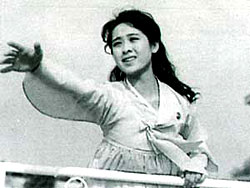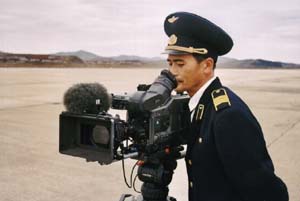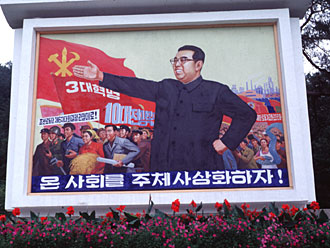Now playing, in Pyongyang
Michael Moore may not be there, but several Hollywood-style movies will be screened in North Korea for the first time, representing radical change for the oddest film festival on Earth.
By Ron Gluckman /Pyongyang, North Korea and Beijing, China
H
OLLYWOOD MIGHT CALL IT THE FILM FEST FROM HELL. After all, there shall be no skin, no stars, and no schmoozing at the Pyongyang International Film Festival, which runs from September 12-20. But for the first time, the festival will have a more
global feel. At least, that is, by the standards of the Hermit Kingdom. This year, the festival will feature some landmark changes, not least
the word "international" in its name.
But for the first time, the festival will have a more
global feel. At least, that is, by the standards of the Hermit Kingdom. This year, the festival will feature some landmark changes, not least
the word "international" in its name.
Pyongyang's film festival dates back to 1987 and has been held every two years since 1990, but was previously known only by the not-quite catchy title of "Pyongyang Film Festival of the Non-aligned and Other Developing Countries."
In years past, the festival was largely a venue for fringe films on the axis of obscurity, with plenty of flicks about Middle East guerilla groups and imperial oppression in Africa. It also offered the opportunity to mingle with actors and directors from the likes of Lebanon, Libya and Vietnam.
Recent galas awarded prizes to Iran and Syria. The top trophy in 1996 went to "Red Cherry," which the program described as a "Chinese tribute to the Chinese and Russian triumph over German fascism in World War II."
This fall the festival will broaden its horizons. The program boasts its first commercial hit in the British comedy "Bend It Like Beckham." Also planned to screen for the first time are a pair of Hollywood-style films, Whoopi Goldberg's "Serafina" and "Cry, the Beloved Country," featuring James Earl Jones and Richard Harris.
The latter two date back to the early '90s; but neither has previously been shown in North Korea. Darrell James Roodt, who directed both films, will be the first American to attend the festival.
 Even Michael Moore's "Fahrenheit 9/11" has been invited to
the oddest film festival on Earth, but not the portly director himself, reliable
sources say.
Even Michael Moore's "Fahrenheit 9/11" has been invited to
the oddest film festival on Earth, but not the portly director himself, reliable
sources say.
While the Bush-bashing opus would be expected to go over big in the People's Paradise, not so the outspoken Mr. Moore. At least, he has been quite fearless, like a roaring lion, raising controversy, from Cannes to Las Vegas. But when it comes to North Korea, Mr. Moore has been silent as a mouse, declining to comment on any participation in this controversial festival.
Still, with Moore, or not, this figures to be a radical festival. While many of these films would never have been considered in Pyongyang's previous film fests, perhaps this new internationalism is not as sudden as it seems.
A few years back, British director Daniel Gordon obtained landmark permission to take a Western crew to film inside the country. The resulting documentary, "The Game of Their Lives," about a North Korean football team that competed in the 1966 World Cup, enjoying a rare streak of success, won widespread acclaim overseas.
The film, however, presented Pyongyang's judges at the last festival in 2002 with a dilemma: How to honor the first British-made film in the competition?
"We won the Special Award," explains Mr. Gordon. Special, indeed, since no such prize previously existed. Also special since both Mr. Gordon and partner Nick Bonner, a fellow Brit based in Beijing who runs tours to North Korea, were not citizens of the non-aligned network of nations.
 This
year, the pair's VeryMuchSo Productions will premier its brand-new sports
documentary, "A State of Mind," following the daily lives and training
of a pair of young female gymnasts in North Korea. And for the first time, this
fall Mr. Bonner's Koryo Tours (www.koryotours.com)
will bring a group of Western film fans to the
festival.
This
year, the pair's VeryMuchSo Productions will premier its brand-new sports
documentary, "A State of Mind," following the daily lives and training
of a pair of young female gymnasts in North Korea. And for the first time, this
fall Mr. Bonner's Koryo Tours (www.koryotours.com)
will bring a group of Western film fans to the
festival.
But even with this new international flavor, the festival is growing increasingly local, and utilizing neighborhood theaters, according to a North Korean involved in the planning.
"More North Koreans than ever before are going to the festival," he says. "Tickets are available in neighborhoods. This is a big event for us."
The festival will offer new treats for moviegoers in North Korea, where, aside from scientific documentaries and the odd Russian feature, all programming comes from the Korea International Film Production Agency.
Formed exactly 50 years ago, the sole film production company in North Korea was run for decades by leader Kim Jong Il, who succeeded his father as ruler of the hard-line Stalinist state. Kim's forte at the studio was propaganda, and he was reportedly a genius. At least, by his own standards; Kim conferred upon himself the title of "Genius of the Cinema."
 Nowadays, the state-run studio still churns out politically correct fare
that, with slight variations, all adhere to a set formula. Backdrops can be
altered for any time period: from Medieval Era to Korean War to Modern Times.
Movie villains may vary from Manchurians to Japanese to Yanks. Unsurprisingly,
the good guys tend to be Korean (naturally, of the Northern variety).
Nowadays, the state-run studio still churns out politically correct fare
that, with slight variations, all adhere to a set formula. Backdrops can be
altered for any time period: from Medieval Era to Korean War to Modern Times.
Movie villains may vary from Manchurians to Japanese to Yanks. Unsurprisingly,
the good guys tend to be Korean (naturally, of the Northern variety).
So this year's festival will offer a rare opportunity for international ideas to reach citizens of a state where all television programming is government-controlled and radios are sold with dials wired to the state station. And with themes that might seem revolutionary here.
While "Bend it Like Beckham" is a light comedy, it does address issues of racism and sexism, as well as a modern urge for Westernization. "Cry, the Beloved Country" largely deals with apartheid in South Africa, but also talks about equality and the need to speak out.
For some attendees, the exclusive festival has a certain cachet, if only for its obscurity. "Unlike Cannes, with 38,000 filmmakers, and everyone pitching, this festival has absolutely no glitz, no glamour," Mr. Gordon explains.
"No deals get done in Pyongyang. In fact, no one else goes," he says, then knowingly adds: "That's practically reason enough to go."
Ron Gluckman is an American reporter based in Hong Kong, who roams around the nether reaches of Asia for a variety of publications, including Time, Newsweek and the Asian Wall Street Journal, which ran this piece in its weekend edition at the end of July 2004.
Picture of guard courtesy of VeryMuchSo Productions. Kim poster by Ron Gluckman. All the rest from the web.
To return to the opening page and index
push here
[right.htm]
